Libyan Capital Markets: Expecting Double Digit Growth
Dr. Ahmed M. Karoud, General Manager of Libyan Stock Market
Only 5% of our economy was in the private sector before. The government is going to set a new law for private companies in Libya, this is expected in May 2013.
Interview with Dr. Ahmed M. Karoud, General Manager of Libyan Stock Market
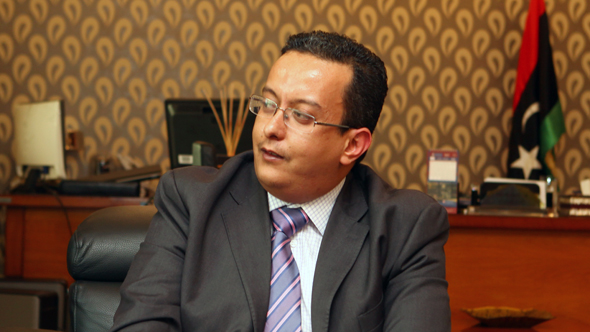
The history of the stock exchange in Libya goes back to 2007 when a sort of reengagement of Libya with the international community began. The Libyan Stock Exchange was founded on the need for privatisation and enterprise, letting capitalism take its own course. Now after the revolution, what are the newest developments in terms of privatisation? Do you see any political will to privatise?
We started the stock exchange in Libya in June 2007 with Libyan insurance companies; these were government companies until they were listed on the Libyan stock exchange. We have about 15 private sector companies listed on the stock exchange now, which include insurance companies, banks and investment companies. Also, the Libyan Stock Market is also listed on the exchange. Over the next couple of years we are looking towards more privatisation but we have a very new government with only one year and a half of being in power, so we are still in early stages for privatisation. This is a new Libya after the revolution.
At the moment it is not the best time to privatise. We can’t do too much after just one year. We have to re-evaluate. For example, prior to the revolution the two largest telecom operators Libyana and Almadar were supposed to be listed on the stock exchange, with an estimated value of LYD 8 billion and today, these two companies must be re-evaluated. That is why the government appointed a new company to carry out research to really understand the values.
For example, prior to the revolution the two largest telecom operators Libyana and Almadar were supposed to be listed on the stock exchange, with an estimated value of LYD 8 billion
Now the government wants the company to investigate the capital, the company, the staff, and all sorts of things. The new government want to have privatisation and to have a good private sector as we didn’t have one before. Only 5% of our economy was in the private sector before. The government is going to set a new law for private companies in Libya, this is expected in May 2013.
We are looking for funding and now we have a new law for the stock exchange and central bank for this funding, because we don’t have any real funds. We have funds in Libya but they are not real funds. We are looking for real estate funds; they are the first thing we are looking for. We are going to give licenses for 3 real estate companies in 2013; these will be the first real funds in Libya. The government is communicating with the central bank to have a new law and committee for these funds.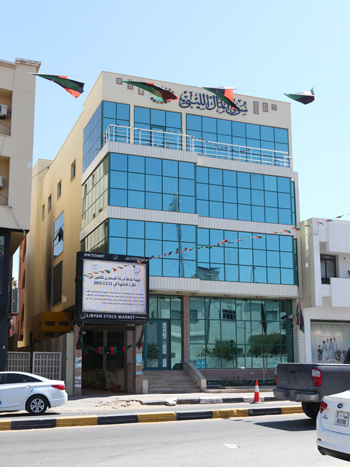
These funds are going to be listed on the stock exchange?
Yes.
Who will buy the shares? Will they be bought by Investors?
They will be public shares. Some financial companies will be listed on the stock exchange. There is about 1.2 billion Libyan dinars worth that will be for the 3 real estate funds. Two of the funds are worth about 500 million Libyan dinars and the other is worth 250 million Libyan dinar. This will happen in 2013.
This will raise the value of the stock exchange by almost 30%, which is a big development.
Yes, the capital for the stock exchange is about 4 billion Libyan dinar and we have two markets in the stock exchange: the value market and the secondary market. We also have 28 companies that we hope to have trading in 2014 that are in a variety of sectors such as real estate, tourism, oil and gas, etc. We have to finish our recommendations and re-evaluations so that we can be they can be listed and trading in the stock exchange in 2014.
Are the 28 companies originally private sector companies?
Not entirely. There is a percentage that is privately owned.
What has been the regulatory approach towards independent regulators in order to copy the best practices of other international stock exchanges? Is there a political will to adopt new laws that will regulate the stock exchange? 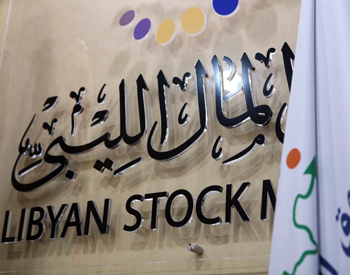
We don’t yet have an authority for the stock exchange here in Libya because we are a civilian stock exchange and we work for the authorities. In June or July of 2013 there will be a new authority issued for the Libyan stock exchange and the insurance sector. Every stock exchange has begun without a regulator and then after a couple of years establishes one. That is why we do not have one yet. The Ministry of the Economy will issue the new regulator for Libya.
What are the latest developments in terms of foreign companies in Libya? Can foreigners now own companies in Libya?
We have foreign investment in Libya and on the stock exchange. However this counts for just 1 or 2% because of the international money transfer issues. The law regarding the stock exchange does not differentiate between home investors and foreign investors. Foreigners can invest in our stock exchange just as the Libyans can. However the problem arises from the difficulties in transferring money internationally. That is why we hope that the Libyan Central bank can look into this issue and make it easier to transfer money internationally, because we do have foreign interest in investing in our stock exchange but the problems come from this issue. International transfers currently can take about 3 weeks to be processed, which is a huge problem for foreign investors.
Is there a procedure for foreign investors to send money to Libya?
Within Libya, the bank transfer system is fine and it’s normal. It is a problem when the transfer is international.
You mean when you want to take you money out of the country?
Yes, this can take up to 3 weeks. 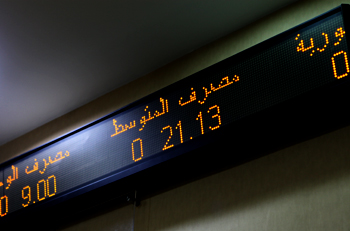
So only 2% of the investment in the stock exchange is from foreign investment?
I would say less than 2%. Only in 2008 or 2009 did foreign investors start to invest here in the stock exchange in Libya.
There is a lot of interest and so therefore there is a lot of potential. Can you talk about the potential for growth in the stock exchange market?
I will speak now about the main benefits that come from the stock market. First, the annual revenues for the listed companies from the stock market ranges between 5 to 20%. The other benefit is that the value of the shares in the stock market is lesser than its real value and this is a natural thing during the times of war or instability. So I think during the coming phase, with the economical improvements and the will for development along with rebuilding the infrastructure, the price of these shares will raise again. The other issue that we spoke about is the annual revenues that have the average of 10 to 15%, and that is considered a great motivating incentive for both the local and foreign investor.
How difficult is it to invest in the stock exchange at the moment? What are the procedures that an investor has to follow?
It is easy and we follow the same procedures as in the other countries. The first step is to have investors who in turn use the same methods to spread information and conduct sales operations via telephone or email. Knowing that the selling or buying operation is easy and it can be made in 3 days just like the investing operations found in other markets. And the only minor challenge lays in money transaction, that’s it.
Are there active brokers that can facilitate the investment in the Libyan stock market?
We have 9 broker companies working here, some of them are in a form of joint ventures with other foreign broker companies. There are 2 Egyptian companies, one from Saudi Arabia and one from Jordan. 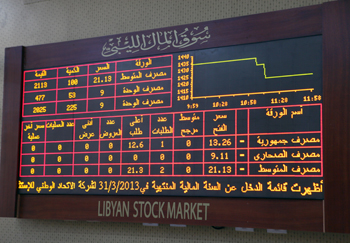
Is there a custodian bank? Institutional investors require a custodian bank when they invest, so can you tell us what are the developments on this front? Is there a way to invest in the stock market but via a bank, with a swap?
We don’t have a custodian bank. It is too early to gives licenses for a custodian bank. We also had some foreign banks come to the stock exchange asking for licenses in 2012 but it’s too early to give license for a custodian bank at the moment. At the same time, the local banks do not know about custodian banks. We are ready to target for change in 2015 and to gain a license from the foreign banks like HSBC or BNP Paribas. But it is too early for this now.
What are the biggest challenges that you are facing in your operations?
Everything! Because our economy is sleeping and that’s the truth.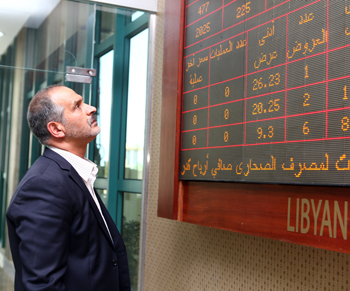
Double digit growth does not suggest a sleeping economy.
Maybe for the oil sector there was a double digit growth. However the real economy was sleeping. You can ask anyone. We want the law to change, before it was for a closed economy and we want to open up to the private sector. Before 2010 there was only 5% private sector contribution in the economy. We want privatisation. We want a new law for the economy and for the central bank. From 2012 there is a new law for the Sharia banks.
The second challenge is applying the law. The resolution that organizes the Libyan Stock Market was issued back in 2010, before that we used to follow the internal regulations and lists. So one of the problems we face is implementing the new laws and resolutions. The other thing is the amendments which need to be made to all the current laws, since the previous regime had a specific ideology toward the economy which was under the influence of the regime’s politics. But now things have changed, we want to improve our economy and we want foreign investors in here. All of these new demands need a new set of rules and regulations because the foreign investor will not come here unless he finds active rules and regulations in place. In the past, foreign investors were hesitant or even scared to come to Libya because they used to say that Libya was a state of decisions not a state of laws, and a decision could simply cancel a certain law, and this gave Libya a bad image. So now we are waiting for the amendments and that is our only problem. When the laws and regulations are active and according to the international standards, you will find that Libya is the best country for foreign investors, because we have the need to rebuild our country in every aspect. We will have plenty of projects, we will be taking a giant step forward, and we will build new infrastructure.
This didn’t take place until now, let us speak openly and deliver a local message to the Minister of Economy in the current government asking for the needed amendments. Sadly, this procedure usually goes in slow stages within our Arab world. Thus we are now waiting for the approval of the presented executive regulations for the stock market, and we are waiting for a new resolution called “the law of companies,” which will replace an old law called “the commercial law” which used to include all the economical and company matters. The new law for companies will focus on the private sector. Therefore we are currently waiting for the implementation of these laws to attract foreign investors.
However the real economy was sleeping. You can ask anyone. We want the law to change, before it was for a closed economy and we want to open up to the private sector. Before 2010 there was only 5% private sector contribution in the economy.
Would you say that you are in the waiting stage at the moment? Do you feel like you are in the middle of something, like you are living the transition at the moment?
We started slowly since the process of change is also progressing at a slow pace. We are facing problems and the first problem we encounter is that the caretaker governments are usually short-term government and it can’t implement a lot of things. The second problem is that we just came out of a war which followed an oppressing regime. It is very difficult to redraft all resolutions and laws, reapprove all the human work force in Libya, reset the future policies and strategic plans for Libya.
We also need to know what the economical needs of the country are, what our goals will be in this regard. Do we want to energize the tourism sector which was dead during the previous regime? Will we focus on the real estate? We just need to know what our future plans will be. Yet sadly, there was used to be no such plan during the past regime and until now we still don’t know where the state wants to go when it comes to the economy and private sector. We don’t know if the current government wants to convince the previous foreign companies to return to Libya or whether they will make the needed amendments in regard to the laws and regulations. There are many questions left unanswered for the time being and the government should make these issues clear for both themselves and Libyans!
What are your expectations for market capitalisation for the end of 2013 and the beginning of 2014 for the 28 companies you mentioned?
We are hoping it to be about 6 or 7 billion Libya dinars at the end of 2013.
Would this be from the real estate funds?
Yes and from the private sector. We are having some meetings with the private sector and with some banks to be listed. There are 4 or 5 banks in Libya that are not yet listed and we are in contact with the central bank to be able to list these banks. We also have had 2 meetings with two banks in Libya to be listed on the stock exchange this year.
Which banks?
One is the Union bank (in Arabic) and also the Libyan Qatari bank.
Are those are the smaller banks – and not the big 5?
The big 5 banks include Jumhouria Bank – the largest bank in Libya, Wahda Bank, Sahara Bank, National Commercial Bank and Libya’s Bank of Commerce and Development and they were listed in 2008/9. They constitute the biggest 5 companies in our stock exchange. Wahda Bank is a joint venture with a Jordanian bank (in Arabic), Bank Sahara is a joint venture with BNP Paribas and the Libya’s Bank of Commerce and Development is in a joint venture with QNB (Qatari National Bank) since June 2012 and QNB owns 49% of this bank.
You are expecting almost 90% growth for the stock exchange.
Yes.
Do you still have problems explaining the background and purpose of the stock exchange. How do you face this in Libya?
Yes, this is the case here in Libya. We now have a committee at the stock exchange to assess this issue and to have contact with the public. Before, Libyans were afraid to invest in any company, due to our previous government and the economic situation we had before. Now we are investing time and money into advertising and workshops, we even go to some universities, so we have a plan to educate people about investing in the stock exchange. We have a budget for this. In 2012 we gave about 10 courses; each one was over 3 days, 2 hours per day, which were great. More than 4,500 Libyan people attended these courses, to understand how to invest in the stock exchange. These courses took place in Benghazi and Tripoli. We have a business centre and a branch in Benghazi
Is there a lot of liquidity in Libya that is available to be invested? There are a lot of savings just sitting there.
There is a lot of money in the banks. In Libya there are two kinds of people; those who follow Sharia law and the others who do not. Every company that is listed in the stock exchange does not follow Sharia. We have listed funds with Sharia; we have to look for Sharia people. We have a financial company and we have banks that have a lot of money, but they don’t know how to invest.
Some Libyans live on the equivalent of 4,000 or 5,000 Euros a year. The minimum monthly wage is about 450 Libyan dinars. The average is about 700 or 800 Libyan dinars which is about 600 Euros. Nevertheless, there are big families with lots of money in Libya.
Do these people normally invest?
No, but now they understand a bit more about our stock exchange. But the average person does not have a lot of savings so they don’t invest. However the big richer families can invest.
What happened to the Libyan investment authority? There are so many foreign assets. Can they be put in use with the stock exchange?
No we don’t know what will happen with the Libyan investment authority. There were some problems with the management. There is now a new management for the Libyan authority, but it is too early to tell what will happen. The new manager has been working for only a couple of weeks. The previous manager had some problems with the government. I don’t know what the new manager’s strategy is. Libya invested a lot of companies in Europe and Africa. It will take time to find a lot of investment. This is political investment. Everything needs to be checked as it is more than 70 billion Libyan dinars.
There is a possibility that the fund would invest in the local economy?
Yes and we have a sort of Libyan investment authority but for internal investment. The capital is about 20 billion Libyan dinars; they started in 2009 and up to now have not made any money. No investment, the funds are frozen.
When the state sets the plan and directions of projects, then what interest will I have in such topics? I give you a margin to work with so you bring the needed people to make the needed change in these institutes. If this local investment fund with its budget of 20 billion Libyan dinar started working back in 2012, we would have made a great change. But we have the problems of arms in the hands of people and the unemployment is caused by the frozen Libyan economy. If that wasn’t the case, we would have already witnessed the return of the foreign companies. Let us speak honestly, back in 2010 we had an improvement when it comes to the private sector and foreign investment, so the companies employed 10 to 15% of the Libyans, but when 2011 came the companies stopped their activities and thus many Libyans, who used to work in these companies, became unemployed, and now you see them holding arms and getting 500 Libyan Libyan dinars from the government while staying in the streets. If you fix this problem and re-energize the economy, that man will have no reason to stay jobless, he will join a company and live a decent life.
We haven’t even fixed the problem of facing foreign investment companies, especially Turkish, English and others; all of them continue to be scared. But also there are other legal matters, these companies demand compensations. The decisions in the world of business are clear and taken from the beginning so why to go back with what you agreed to do? This is the problem we are facing now. Now, it is true that security is a must to any business but I must emphasize that the issue of security in Libya isn’t as scary as portrayed in the media; it is actually not that deteriorated! Moreover, one must keep in mind that the high risk goes hand in hand with high return, so this proves to be the best chance for the foreign investor to venture into the Libyan market at this early stage, and that will make his returns much higher than what he can earn in later stage when competition will grow against him. But all of that is met with one question by the foreign investor which is: What are the guarantees you will offer to me? If there were regulations and laws to keep things in order, he would have with no problem in mind, because in case of any problem he would turn to courts to seek help.
The foreign investors want these problems to be solved, and the way to resolve the problem of letting the money come into the country is through the national bank. The investor wants to sell another investor from another market and want to get paid quickly and not wait for 2 or 3 weeks; this is the job of the national bank!